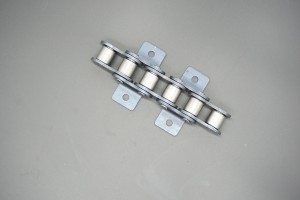B Series Chain’s Corrosion Resistance Advantages: Providing Long-Lasting and Reliable Transmission Solutions for Industrial Environments
In the industrial transmission sector, chain corrosion resistance is a key factor in determining equipment operational stability, maintenance costs, and service life. This is particularly true in industries such as chemical processing, food processing, marine engineering, and wastewater treatment, which are subject to harsh environments such as moisture, acidic and alkaline conditions, and salt spray. A chain’s corrosion resistance is directly linked to production continuity and safety. As a key category of industrial transmission chains, the B Series chain demonstrates significant advantages in corrosion resistance, making it a preferred choice for international professional wholesale buyers facing complex working conditions.
Material Selection: Building a Strong Anti-Corrosion Defense from the Source
B Series chains are carefully selected for corrosion resistance, laying a solid foundation for their excellent corrosion resistance.
Typically, B Series chains utilize high-quality alloy steel as their base material. These alloy steels contain alloying elements such as chromium, nickel, and molybdenum, which form a dense oxide film, also known as a passivation film, on the steel surface. This passivation film acts as a solid barrier, effectively preventing oxygen, moisture, and other corrosive media from chemically reacting with the steel, significantly reducing the likelihood of corrosion.
Compared to ordinary carbon steel chains, B-series chains made from this alloy steel are less susceptible to rust in humid environments and maintain good structural stability even when exposed to certain concentrations of acids and bases. For example, in the food processing industry, equipment requires frequent cleaning, and chains are frequently exposed to water and detergents. Conventional chains are susceptible to rust due to long-term moisture erosion, affecting transmission accuracy and service life. However, B-series chains, thanks to their high-quality materials, can maintain excellent operating conditions in such environments for a long time.
Surface Treatment: Multiple Processes Enhance Corrosion Resistance
In addition to a high-quality base material, B-series chains undergo a variety of advanced surface treatments to further enhance their corrosion resistance.
Common surface treatments include galvanizing, chrome plating, phosphating, and special anti-corrosion coatings. Galvanizing forms a zinc coating on the chain’s surface. Zinc oxidizes first in corrosive environments, protecting the chain’s base material from corrosion. This sacrificial anode protection effectively extends the chain’s service life. Chrome plating forms a hard, wear-resistant, and chemically stable chromium layer on the chain’s surface, protecting it from corrosive media and reducing wear during operation.
Phosphating forms a phosphate film on the chain’s surface through a chemical reaction. This film has excellent adsorption and corrosion resistance, improving the chain’s surface adhesion to the coating and paving the way for subsequent coating processes. Specialized anti-corrosion coatings, such as polytetrafluoroethylene (PTFE), create an inert protective layer on the chain’s surface that is virtually unreactive with corrosive substances, making it suitable for use in highly corrosive environments.
Structural Design: Reduces the Accumulation and Erosion of Corrosive Media
The B Series chain’s structural design takes corrosion resistance into full consideration. By optimizing its structure, it reduces the accumulation of corrosive media on the chain, thereby reducing the likelihood of corrosion.
During chain operation, dust, moisture, and corrosive media can easily accumulate in the gaps between chain links and at the meshing points between the chain and sprocket. The B Series chain’s design incorporates special features such as increased gaps between links to facilitate the drainage of corrosive media and a special tooth profile to reduce media accumulation at the meshing points between the chain and sprocket.
Furthermore, the B Series chain’s connection method has been optimized, utilizing high-strength connectors and sealed joints to prevent corrosive media from entering the joints and preventing corrosion-induced failure. This rational structural design ensures that the B Series chain maintains excellent ventilation and drainage in harsh environments, reducing the risk of persistent corrosion from corrosive media.
Practical Application Verification: Excellent Performance in Harsh Environments
The corrosion resistance advantages of the B Series chain are not only demonstrated in theory and process, but have also been fully verified in practical applications.
In marine engineering, equipment is exposed to salt spray for long periods of time. The chloride ions in salt spray are extremely corrosive and can cause significant damage to chains. However, marine equipment equipped with the B Series chain has maintained excellent performance after long-term use, without experiencing severe rust or damage, ensuring normal operation of the equipment.
In the chemical industry, many production processes involve various acidic and alkaline solutions. Ordinary chains often corrode and become useless in such environments after a short period of use. However, the B Series chain, with its excellent corrosion resistance, can operate stably in such environments for long periods of time, significantly reducing equipment maintenance frequency and replacement costs.
In the sewage treatment industry, chains must operate in an environment filled with sewage and various microorganisms. Harmful substances in the sewage can cause continuous corrosion to the chains. The use of the B Series chain in sewage treatment equipment effectively resists corrosion from sewage and ensures the continuous operation of the sewage treatment process.
Summary
The B-series chain boasts numerous advantages in corrosion resistance, from high-quality materials to advanced surface treatments and rational structural design. Each component contributes to its robust corrosion resistance. These advantages enable the B-series chain to operate stably in a variety of harsh industrial environments, reliably ensuring the continuity and safety of industrial production.
For international wholesale buyers, choosing the B-series chain not only meets the needs of diverse customers in complex working conditions but also offers higher economic benefits through its long service life and low maintenance costs. In future industrial development, the B-series chain, with its outstanding corrosion resistance, is poised to find widespread application in even more areas.
Post time: Aug-18-2025

